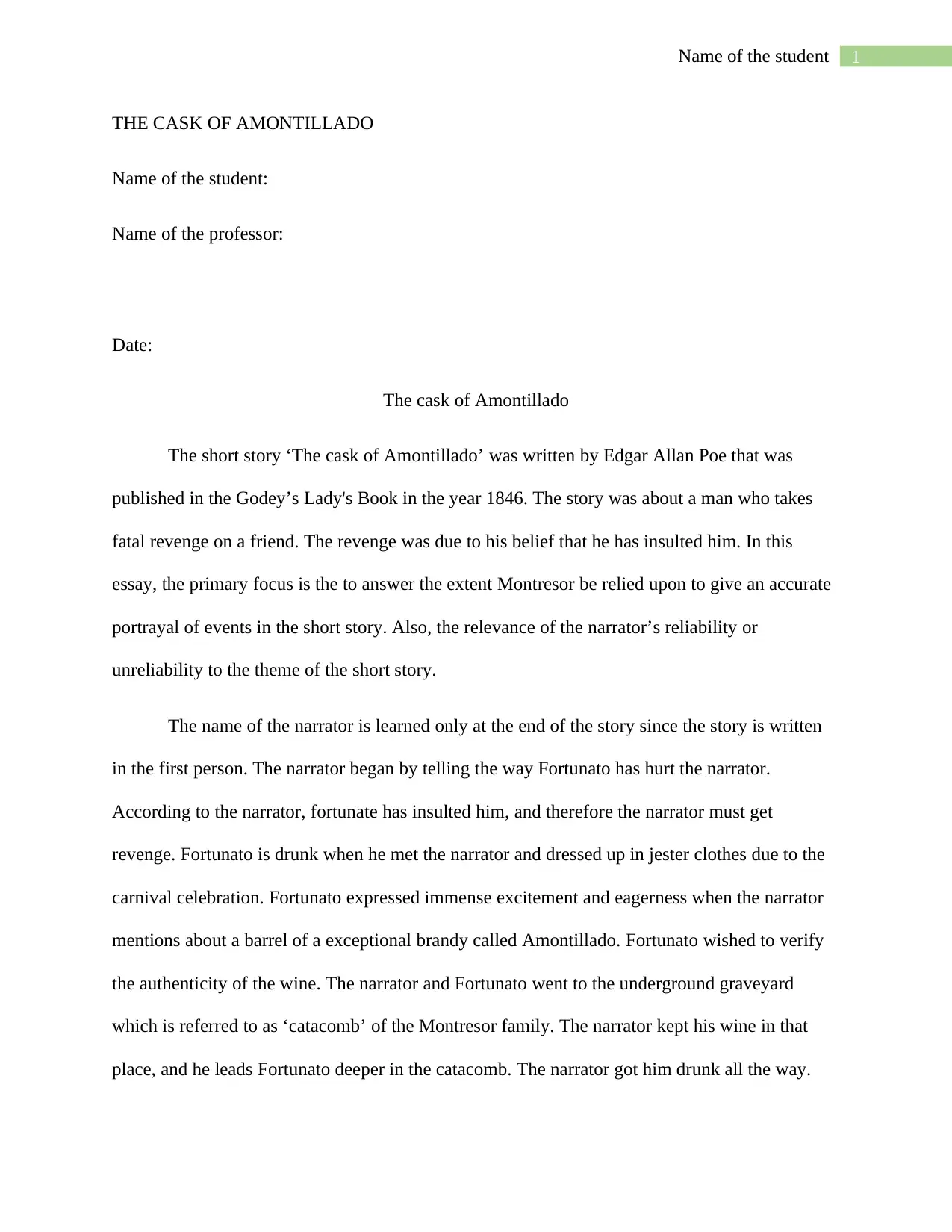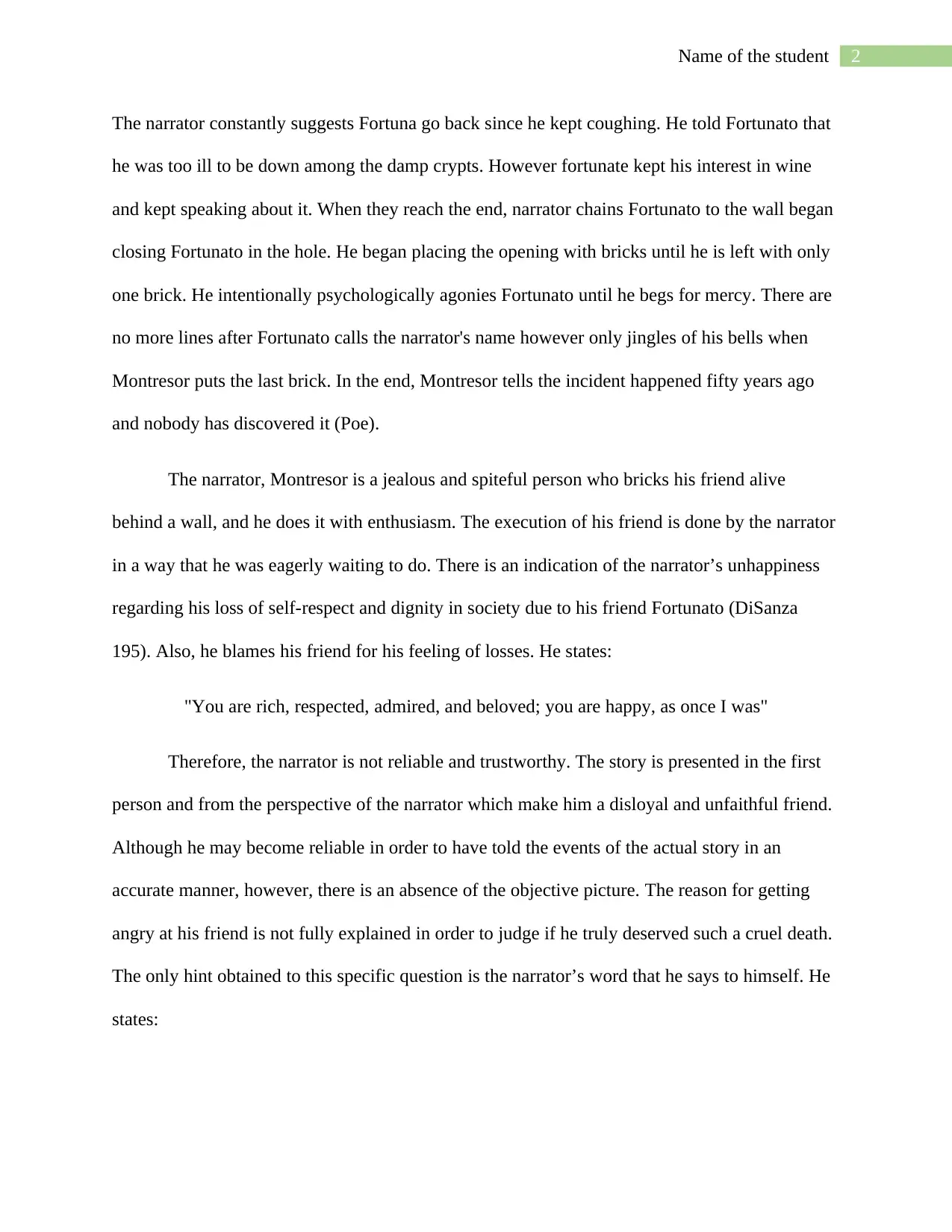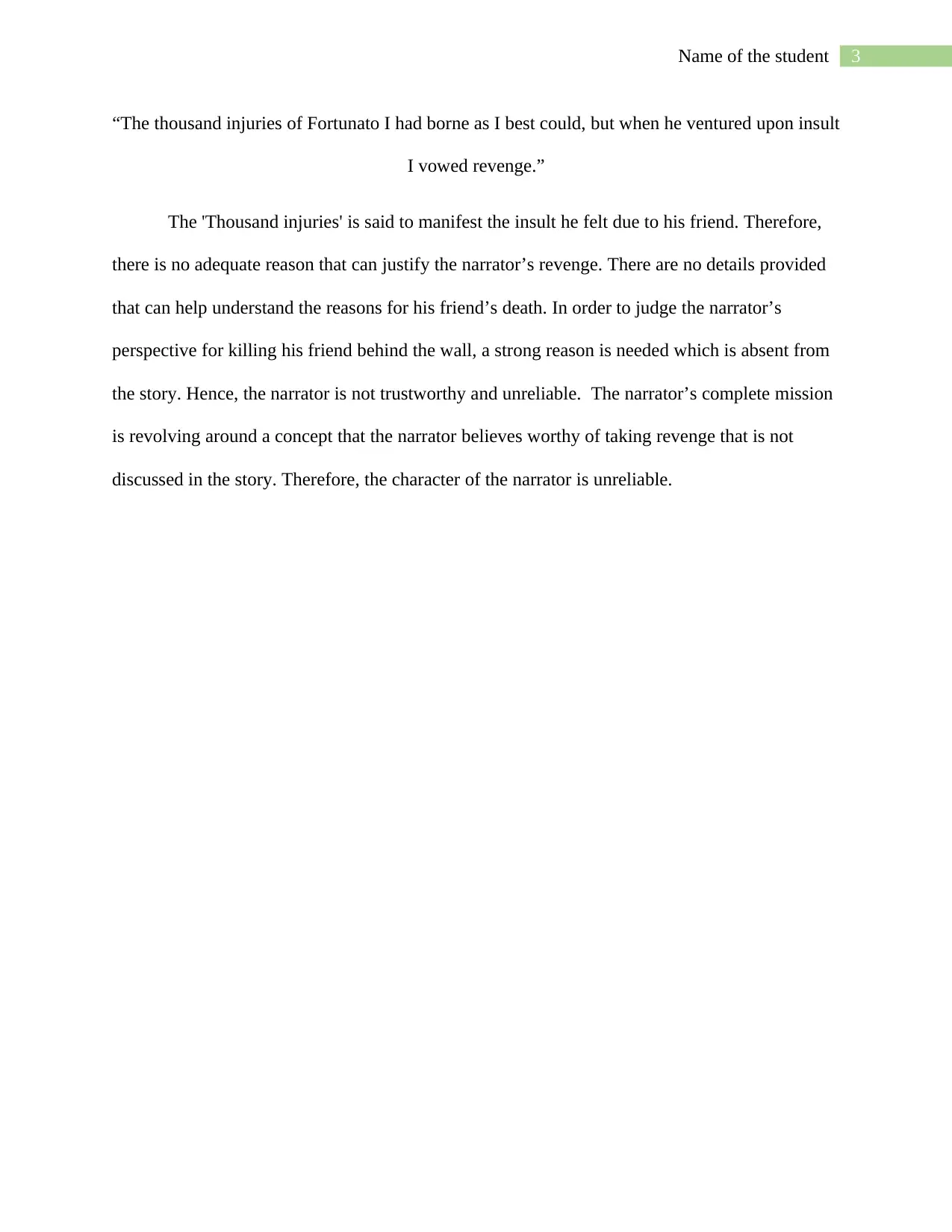Essay on Montresor's Reliability in Edgar Allan Poe's Short Story
VerifiedAdded on 2023/04/23
|4
|862
|258
Essay
AI Summary
This essay examines the reliability of Montresor as the narrator in Edgar Allan Poe's 'The Cask of Amontillado,' focusing on his portrayal of events and its impact on the story's theme. The essay argues that Montresor, driven by jealousy and spite, cannot be considered a reliable narrator due to his biased perspective and lack of objective justification for his vengeful actions against Fortunato. The absence of a balanced viewpoint and the narrator's self-serving account of the events contribute to the conclusion that Montresor's narrative is untrustworthy, ultimately shaping the reader's understanding of the story's themes of revenge and deception.

1Name of the student
THE CASK OF AMONTILLADO
Name of the student:
Name of the professor:
Date:
The cask of Amontillado
The short story ‘The cask of Amontillado’ was written by Edgar Allan Poe that was
published in the Godey’s Lady's Book in the year 1846. The story was about a man who takes
fatal revenge on a friend. The revenge was due to his belief that he has insulted him. In this
essay, the primary focus is the to answer the extent Montresor be relied upon to give an accurate
portrayal of events in the short story. Also, the relevance of the narrator’s reliability or
unreliability to the theme of the short story.
The name of the narrator is learned only at the end of the story since the story is written
in the first person. The narrator began by telling the way Fortunato has hurt the narrator.
According to the narrator, fortunate has insulted him, and therefore the narrator must get
revenge. Fortunato is drunk when he met the narrator and dressed up in jester clothes due to the
carnival celebration. Fortunato expressed immense excitement and eagerness when the narrator
mentions about a barrel of a exceptional brandy called Amontillado. Fortunato wished to verify
the authenticity of the wine. The narrator and Fortunato went to the underground graveyard
which is referred to as ‘catacomb’ of the Montresor family. The narrator kept his wine in that
place, and he leads Fortunato deeper in the catacomb. The narrator got him drunk all the way.
THE CASK OF AMONTILLADO
Name of the student:
Name of the professor:
Date:
The cask of Amontillado
The short story ‘The cask of Amontillado’ was written by Edgar Allan Poe that was
published in the Godey’s Lady's Book in the year 1846. The story was about a man who takes
fatal revenge on a friend. The revenge was due to his belief that he has insulted him. In this
essay, the primary focus is the to answer the extent Montresor be relied upon to give an accurate
portrayal of events in the short story. Also, the relevance of the narrator’s reliability or
unreliability to the theme of the short story.
The name of the narrator is learned only at the end of the story since the story is written
in the first person. The narrator began by telling the way Fortunato has hurt the narrator.
According to the narrator, fortunate has insulted him, and therefore the narrator must get
revenge. Fortunato is drunk when he met the narrator and dressed up in jester clothes due to the
carnival celebration. Fortunato expressed immense excitement and eagerness when the narrator
mentions about a barrel of a exceptional brandy called Amontillado. Fortunato wished to verify
the authenticity of the wine. The narrator and Fortunato went to the underground graveyard
which is referred to as ‘catacomb’ of the Montresor family. The narrator kept his wine in that
place, and he leads Fortunato deeper in the catacomb. The narrator got him drunk all the way.
Paraphrase This Document
Need a fresh take? Get an instant paraphrase of this document with our AI Paraphraser

2Name of the student
The narrator constantly suggests Fortuna go back since he kept coughing. He told Fortunato that
he was too ill to be down among the damp crypts. However fortunate kept his interest in wine
and kept speaking about it. When they reach the end, narrator chains Fortunato to the wall began
closing Fortunato in the hole. He began placing the opening with bricks until he is left with only
one brick. He intentionally psychologically agonies Fortunato until he begs for mercy. There are
no more lines after Fortunato calls the narrator's name however only jingles of his bells when
Montresor puts the last brick. In the end, Montresor tells the incident happened fifty years ago
and nobody has discovered it (Poe).
The narrator, Montresor is a jealous and spiteful person who bricks his friend alive
behind a wall, and he does it with enthusiasm. The execution of his friend is done by the narrator
in a way that he was eagerly waiting to do. There is an indication of the narrator’s unhappiness
regarding his loss of self-respect and dignity in society due to his friend Fortunato (DiSanza
195). Also, he blames his friend for his feeling of losses. He states:
"You are rich, respected, admired, and beloved; you are happy, as once I was"
Therefore, the narrator is not reliable and trustworthy. The story is presented in the first
person and from the perspective of the narrator which make him a disloyal and unfaithful friend.
Although he may become reliable in order to have told the events of the actual story in an
accurate manner, however, there is an absence of the objective picture. The reason for getting
angry at his friend is not fully explained in order to judge if he truly deserved such a cruel death.
The only hint obtained to this specific question is the narrator’s word that he says to himself. He
states:
The narrator constantly suggests Fortuna go back since he kept coughing. He told Fortunato that
he was too ill to be down among the damp crypts. However fortunate kept his interest in wine
and kept speaking about it. When they reach the end, narrator chains Fortunato to the wall began
closing Fortunato in the hole. He began placing the opening with bricks until he is left with only
one brick. He intentionally psychologically agonies Fortunato until he begs for mercy. There are
no more lines after Fortunato calls the narrator's name however only jingles of his bells when
Montresor puts the last brick. In the end, Montresor tells the incident happened fifty years ago
and nobody has discovered it (Poe).
The narrator, Montresor is a jealous and spiteful person who bricks his friend alive
behind a wall, and he does it with enthusiasm. The execution of his friend is done by the narrator
in a way that he was eagerly waiting to do. There is an indication of the narrator’s unhappiness
regarding his loss of self-respect and dignity in society due to his friend Fortunato (DiSanza
195). Also, he blames his friend for his feeling of losses. He states:
"You are rich, respected, admired, and beloved; you are happy, as once I was"
Therefore, the narrator is not reliable and trustworthy. The story is presented in the first
person and from the perspective of the narrator which make him a disloyal and unfaithful friend.
Although he may become reliable in order to have told the events of the actual story in an
accurate manner, however, there is an absence of the objective picture. The reason for getting
angry at his friend is not fully explained in order to judge if he truly deserved such a cruel death.
The only hint obtained to this specific question is the narrator’s word that he says to himself. He
states:

3Name of the student
“The thousand injuries of Fortunato I had borne as I best could, but when he ventured upon insult
I vowed revenge.”
The 'Thousand injuries' is said to manifest the insult he felt due to his friend. Therefore,
there is no adequate reason that can justify the narrator’s revenge. There are no details provided
that can help understand the reasons for his friend’s death. In order to judge the narrator’s
perspective for killing his friend behind the wall, a strong reason is needed which is absent from
the story. Hence, the narrator is not trustworthy and unreliable. The narrator’s complete mission
is revolving around a concept that the narrator believes worthy of taking revenge that is not
discussed in the story. Therefore, the character of the narrator is unreliable.
“The thousand injuries of Fortunato I had borne as I best could, but when he ventured upon insult
I vowed revenge.”
The 'Thousand injuries' is said to manifest the insult he felt due to his friend. Therefore,
there is no adequate reason that can justify the narrator’s revenge. There are no details provided
that can help understand the reasons for his friend’s death. In order to judge the narrator’s
perspective for killing his friend behind the wall, a strong reason is needed which is absent from
the story. Hence, the narrator is not trustworthy and unreliable. The narrator’s complete mission
is revolving around a concept that the narrator believes worthy of taking revenge that is not
discussed in the story. Therefore, the character of the narrator is unreliable.
⊘ This is a preview!⊘
Do you want full access?
Subscribe today to unlock all pages.

Trusted by 1+ million students worldwide

4Name of the student
Work cited:
DiSanza, Raymond. "On Memory, Forgetting, and Complicity in “The Cask of
Amontillado”." The Edgar Allan Poe Review15.2 (2014): 194-204.
Poe, Edgar Allan. The cask of Amontillado. Sheba Blake Publishing, 2017.
Work cited:
DiSanza, Raymond. "On Memory, Forgetting, and Complicity in “The Cask of
Amontillado”." The Edgar Allan Poe Review15.2 (2014): 194-204.
Poe, Edgar Allan. The cask of Amontillado. Sheba Blake Publishing, 2017.
1 out of 4
Related Documents
Your All-in-One AI-Powered Toolkit for Academic Success.
+13062052269
info@desklib.com
Available 24*7 on WhatsApp / Email
![[object Object]](/_next/static/media/star-bottom.7253800d.svg)
Unlock your academic potential
Copyright © 2020–2026 A2Z Services. All Rights Reserved. Developed and managed by ZUCOL.





